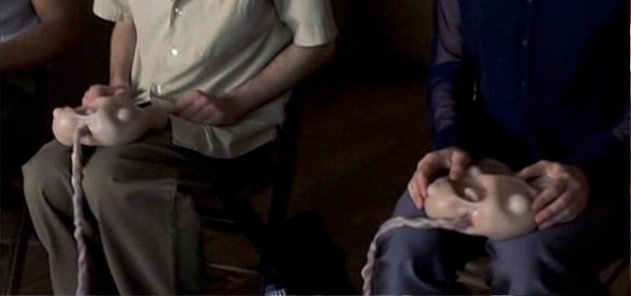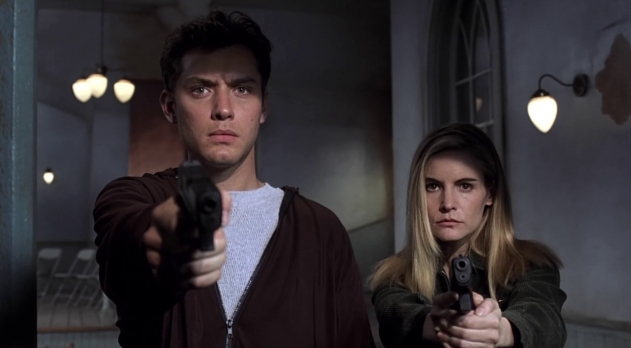
David Cronenberg’s 1999 feature film EXISTENZ with Jennifer Jason Leigh and Jude Law unfolds in multiple layers of reality. It takes place in a future where games are made from biological materials powered by peoples’ bodies. The game consoles have fleshy appendages and buttons, which require stroking. They attach to the body via an umbilical cord.
Dr. Duncan Buell is a computer scientist at the University of South Carolina who has loved science fiction since he was a child. On June 21, he introduced a screening of EXISTENZ at the Nickelodeon Theatre in Columbia, South Carolina as part of the theatre’s Science on Screen series. The series was begun at the Coolidge Corner Cinema and is funded by the Sloan Foundation which gives seed grants to nonprofit cinemas across the country. Science & Film spoke on the phone with Dr. Buell from his office prior to the screening:
Science & Film: What do you find most interesting about EXISTENZ?
DB: There are several themes that show up in the film. One theme is games within games. Some of this was reprised in THE MATRIX but this was a 1999 film. I haven’t been able to come up films with that theme that came out earlier than EXISTENZ. The layers of reality is another theme. Ellen Page was in INCEPTION, where people go to sleep and then they go into a different reality, but that’s much newer too. One of the other themes is this whole question of artificial intelligence. There are two kinds. There have been articles in Wired recently that say, we’re not going to program computers anymore, we’re going to train them. Computers will be smart. I think that’s complete nonsense. Machine learning will do great things but the machine that learns still has to be programmed once at least. Another theme is this whole question of bio-computing. There was the film JOHNNY MNEMONIC where the character carried some piece of information via a silicon chip. There are some movies or books which predate EXISTENZ, but most of that is not in this sense where the computer was organic that was being connected to the human being.

I’m not going to talk about any of the psychology of what happens if you play too many games, I don’t know anything about that, although the film does raise that very interesting issue when Jennifer Jason Leigh shoots Ian Holm and then says, are you sure that wasn’t just a game?
S&F: Is it possible that the advances depicted in the film will become a reality?
DB: The only part of the film that I think is not real yet is the idea that the computer would be organic. The game pod they had was organic so the idea was that you have this organic computer that you’re fusing with your own body, with complications. It’s very dangerous in one sense, because it is almost like infecting your body with something. People are trying to do this kind of thing, but they haven’t gotten very far with it yet.
S&F: For most of the movie it seemed so progressive because a woman is the game designer and lead character. It brought up an interesting point about diversity in the field and STEM learning, which I know you are interested in.
DB: That was actually very advanced. There is a huge discussion in the gaming world about why it is that the women characters generally are exaggeratedly sexual; they are all Wonder Woman-type, whereas the male characters are not like that. Games are made mostly by men. There is a whole question about gaming and who is doing gaming. EXISTENZ is different in that it’s virtual reality. I thought it was very advanced that the game designer was a woman. I’m not sure there are many of them out there. But, in the end she shows that she can be just as ignorant of the consequences of what she’s doing as anybody else.

S&F: What film or television do you think contains the best representations of VR or gaming?
DB: This is not regarding VR or gaming, but Robert Heinlein is an old novelist who wrote about putting your entire self into a computer so you don’t really die. I read him when I was in grad school. The scientist does this and he then meets up with someone he had an affair with years ago and they have another affair in cyberspace. That was very advanced. The other one which is similar is Accelerando by Charles Stross who is one of my favorite sci-fi writers. In that, the person puts himself into cyberspace and then goes on a physical mission at close to light speed and when he comes back he hasn’t aged and yet everyone else is gone. I’m not sure I have a similar favorite about bio-computing or virtual reality in film. I really wasn’t all that thrilled with THE MATRIX.
S&F: Why not?
DB: It had great graphics, but I’m not sure they really advanced the plot, except for the purpose of having a really good thriller movie. I think the filmmakers spent more time just having this adventure movie. EXISTENZ spends a little more time worrying about what layers of reality they are investigating.
I just saw the first showing of BRAINDEAD, the new TV show done by the same person who did THE GOOD WIFE—this is a sort of INVASION OF THE BODY SNATCHERS kind of thing. In most representations it’s dystopian where people cease to be human when they are taken over by the device or alien organism.

S&F: Is your interest in science fiction part of why you were interested in the field of computer science in the first place?
DB: I have been reading science fiction for a very long time. My father had a wonderful collection and I read it almost all the way through. The only science fiction that I don’t find interesting are the space westerns. I like the ones that explore who we are as people and what constitutes human beings and human society. One of my favorite stories is from the 1950s where two astronauts land on a planet which has prairie dog animals and one of the astronauts goes on trial for killing one. The whole question was, is it an animal or is it a sentient being, because the laws are different. They eventually rule in favor of sentience because these prairie dogs bury their compatriots, so they clearly have passed some line into being aware that they actually exist. Some animals will recognize themselves in mirrors and some won’t.
S&F: Why do you think speaking about EXISTENZ is important?
DB: Part of the reason I do this is that we need more scientists as public intellectuals. Certainly with computers we need to do a whole lot more education of the public about what computers can do and cannot do.
EXISTENZ was screened at the Metrograph Theater as part of its series, “Shall We Play A Game?” which included other films such as WARGAMES and TRON.
Science & Film has covered other Science on Screen programs such as a screening of JURASSIC WORLD introduced by famed paleontologist Jack Horner.
PARTNERS
TOPICS